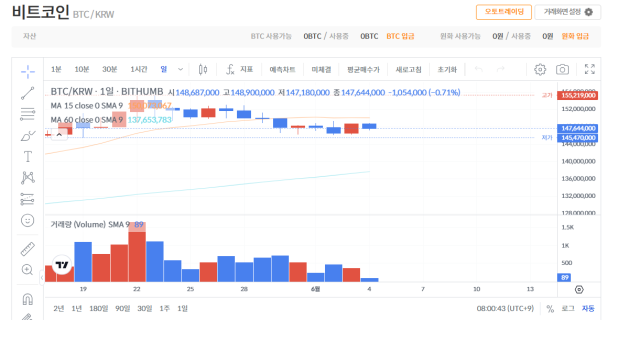
As Lee Jae-myung, who promised to "make South Korea a digital asset hub," was elected as the 21st president, major cryptocurrencies like Bitcoin (BTC) and Ethereum (ETH) are showing a downward trend on domestic exchanges. This is different from the slight upward movement seen on overseas exchanges.
At 8 AM on the 4th, the price of one BTC on Bithumb was 147,644,000 won, down 0.71% from 24 hours ago. ETH dropped 1.65% to 3,635,000 won, and Solana (SOL) fell 4.39% to 217,700 won. Among major cryptocurrencies, only XRP rose 0.96% to trade at 3,152 won.
In contrast, overseas exchanges are generally showing an upward trend. According to the global cryptocurrency market tracking site CoinMarketCap, BTC recorded 105,903.96 dollars, up 0.18% from the previous day. ETH also rose 1.07% to 2,609.82 dollars, and XRP increased 3.08% to 2.26 dollars. However, SOL declined 0.03% to 156.26 dollars.
Previously, Lee Jae-myung addressed digital assets as part of 'fair economy' in his campaign policy manifesto, indicating plans to establish a foundation for nurturing the cryptocurrency industry. He particularly showed a strong will to develop the industry through his pledge to "make South Korea a digital asset hub". He is expected to actively respond to the Trump administration's moves to expand stablecoin influence and cryptocurrency policies.
Specifically, he plans to complete the second-stage cryptocurrency legislation pursued by financial authorities and establish an innovation roadmap for national industry development. The plan includes discovering demonstration projects led by the private sector and increasing the effectiveness of blockchain special zones through regulatory simplification. The Democratic Party discussed the second-stage cryptocurrency legislation direction through the Digital Asset Committee during the election campaign.
Key promises include allowing the issuance of won-based stablecoins and introducing Exchange Traded Funds (ETF) based on major cryptocurrencies like Bitcoin. The president emphasized in a discussion with economic YouTubers that "establishing a won stablecoin market can prevent capital outflow". The financial sector is concerned that dollar stablecoins like Tether (USDT) and USD Coin (USDC) could infiltrate the domestic market through regulatory gaps, potentially causing capital outflow and disrupting monetary order.
The plan to introduce cryptocurrency spot ETFs is also a different approach from the previous government. The Yoon Suk-yeol administration was lukewarm about introducing spot ETFs, concerned about potential stock market decline due to massive fund transfers. The president previously stated on Facebook that he would "introduce cryptocurrency spot ETFs to help young people build assets and establish an integrated monitoring system".
He also pledged to encourage cryptocurrency trading fee reductions. The goal is to lower transaction fees at the top 5 won exchanges (Upbit, Bithumb, Korbit, Coinone, Gopax), which currently hover around 0.2%.
He promised to expand Token Securities (STO) business opportunities by allowing tokenization of traditional assets like government bonds, artworks, and patents for trading within the institutional framework.
The Crypto Fear and Greed Index by alternative data analysis company AlternativeDotMe remained at 64 points, indicating a "greed" state. The index suggests investment sentiment is constrained when closer to 0 and market overheating when closer to 100.
- Reporter Shin Jung-seop
< Copyright ⓒ Decenter, reproduction and redistribution prohibited >







